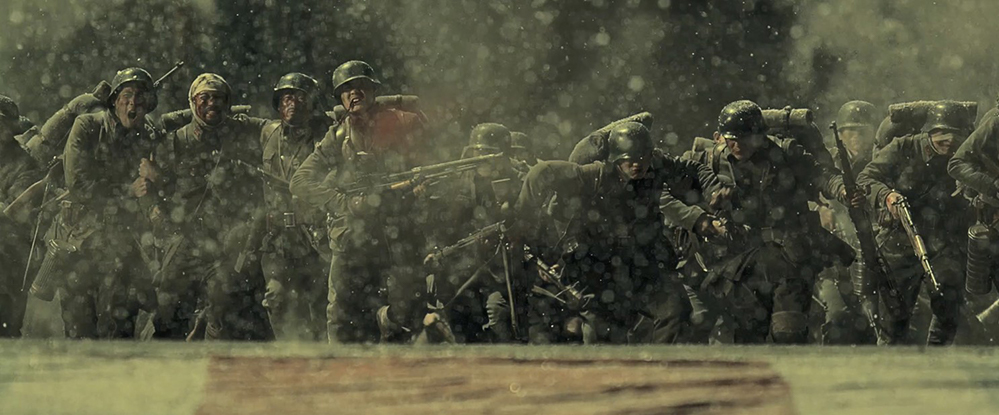Fresh from the CCP censor’s black box comes 2020’s most unlikely blockbuster.
Originally slated for release in July 2019 The Eight Hundred was shelved at the last minute, allegedly for insufficient patriotism, but now has finally been released (in a shorter, presumably censored cut) to fill mainland Chinese theatres as they reopen, where audiences are flocking to it in droves. I thought it was pretty decent.
The Eight Hundred tells the story of the 88th Division of the Kuomintang (nationalist) army, who held off twenty thousand Japanese soldiers in Shanghai for four days during the Sino-Japanese war. Lacking anything close to a main protagonist, it focuses not only on dozens of the 88th’s soldiers but also on refugees, foreign observers, and pretty much everyone else nearby.
Happening across the river from the neutral international zone, the battle was watched and reported on by locals who’d fled there and the foreign press, and the movie is largely split between scenes of Chinese soldiers martyring themselves in bloody fashions worthy of Mel Gibson and people across the river watching them, reporting on the battle or trying to collect and send supplies to the soldiers. Or sometimes just cheering them on like it’s a football match.
When I say martyred I mean that as literally as possible. Not only do our heroes get exsanguinated in slow motion by enemy machine guns and katanas, but at one point we see men lining up by a high window with bundles of grenades tied to them, with which they suicide bomb squads of Japanese soldiers as they run up to the building. It is a film relentless in its unceasing parade of ultraviolent death.
Not that this has much in common with history.
While we see hundreds of KMT soldiers fall defending their country the real 88th Division lost exactly ten men, and the Japanese air force, for obvious reasons, did not strafe the international zone with machine gun fire.
There’s also one moment which really startled me, and I imagine will other western viewers. Watching this film I had no idea the KMT, being fanatical anti-communists, were great pals with Nazi Germany, hence the characters talking a lot about how great their German training and guns are (though I don’t remember seeing many German guns). Midway through a German journalist sneaks several Chinese journalists over the bridge under their country’s flag, so you get the sight of a massive swastika crossing the bridge filmed in a way to convey “Yay, someone’s come to help us!”
Like a lot of mainland Chinese films today the western characters seem to have been cast by the filmmakers asking “Does anyone on set know any white people? Doesn’t matter if they can act.” While never reaching Ip Man 2 levels of bizarrely terrible acting, almost every cut to a white character in a tense moment punctures that tension like a sniper’s bullet.
How much you will enjoy this film depends on how much you can stomach nationalist propaganda.
If blatant and unbelievably gory flag waving (literally, a whole chunk of the movie is devoted to defending the flag) doesn’t phase you you’ll probably like it. It’s a more compelling propagandistic war film than the others I’ve seen lately from mainland China, with more compelling and likable characters than Operation Red Sea or Wolf Warrior 2, even if it never comes close to the artistic greatness of Hero.
The film’s main flaw is really that its propaganda gets too didactic in the last act, when grand speeches about fighting for one’s country start to distract from the actual business of fighting (and dying in slow motion) for it. Watching people die for a cause is inspiring. Watching them talk about it less so.






